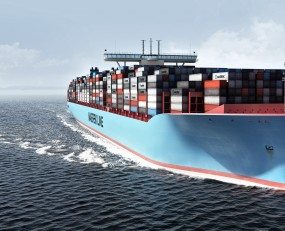
Soren Skou, CEO of A.P. Moller-Maersk, made a number of forthright comments over the prospects for global trade and container shipping after announcing Maersk’s first quarter results.
During the presentation of the numbers Mr Skou was cautious but observed that the “risk from a trade war” meant that there were considerable uncertainties for Maersk’s performance in 2019. He suggested that trade frictions could push container shipping volume growth “to the lower end” of the 1-3% that Maersk stated as their expectation for market growth.
Yet in what appear to be unrecorded comments after the presentation, Mr Skou is reported elaborating on his perception of the market; “What is happening at the moment is that US importers are touring China and trying to pressure their suppliers to lower prices, so they eat their share of the tariffs,” Skou said. “On top of that, there’s some help from a depreciation in the Chinese currency. And then there are a lot of efforts to find similar products to import from other countries in Asia: like Vietnam, Indonesia, Cambodia.”
He also observed that “2019…. will be the year of the trade war, no matter what happens between the US and China”. After China, “we’ll just see the US turning its attention toward Europe, where there is an unresolved issue with German automakers and other things.”
Despite this, Mr Skou appeared sanguine over the macro prospects; “if the US economy continues to be strong and unemployment stays very low, then the impact will be relatively limited.”
The first quarter results themselves saw a moderately good start to the year, with revenue up 2.5% and ‘Earnings Before Interest, Depreciation and Amortisation’ up 33%, hitting an operational profit margin of 13%. That said voices have pointed out that Maersk is lagging some of its competitors in terms of profit growth, something that the Danish company seems sensitive to, with an explicit commitment to pursuing margin quality rather than market share. Certainly, in the first quarter Maersk Line’s average freight rate rose by 3.9% yet its volumes fell by 2.2%. Maersk also cut its debt burden of $12.6bn by $2.4bn.
Things are more stable at A.P.Moller-Maersk but its focus is clearly on improving long-term profitability.
Source: Transport Intelligence, May 28, 2019
Author: Thomas Cullen